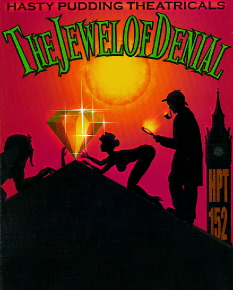Just Plain Silliness

Viewed in this light, this year's production, The Jewel of Denial, was a brash winner. It didn't let up. It was big, bright, loud. If the clunky joke in the title didn't make you smile--or wince--there was enough song-and-dance and slapstick and excruciating punning to lift a grin, or to stir a groan, in even the most straight-faced audience.
In the classroom, undergraduates have traditionally learned that two genres command the stage, Tragedy and Comedy. Outside the classroom, from sources as diverse as Alice in Wonderland and vaudeville and the Marx Brothers and Monty Python, they've learned that the thriving Farce is something else again--far removed from both the tragic and comic in its willingness to sacrifice everything (plausibility, plot development, character consistency, even the author's self-pride) in pursuit of a chuckle. Or as the struggling stand-up comic in a dive once put it, "Laugh harder, folks. I can't afford to lose this job."
As tradition demands, all roles in The Jewel of Denial--men and women, boys and girls--were played by male undergraduates. (Tradition has a particularly powerful claim here, since this was the 152d annual production--making the Pudding much the oldest Whatever-it-is in the country.) Tradition also calls for a Hasty Pudding show to include a kick-line in drag, here served up in the blazing trappings of the Union Jack. In recent years, so much grave literary attention has been focused on the drag phenomenon, and its importance as a tool of gender redefinition and cultural subversion, et cetera, that it was cheering to be reminded that the spectacle of a group of young men, at varying heights and weights and athletic ability, leaping around in miniskirts can be--thank heavens--pretty silly-looking.
Book and lyrics were by Andrew Dudley and Nick Grandy, both of them seniors, and music by David Liang, also a senior. This year's creative trio will be missed. Liang's bright melodies shifted adroitly and wittily from one style to another, and some of the lyrics showed a dexterity and finish that many a current show on Broadway--where the old-fashioned, well-made light-verse lyric is seemingly passé--could profit by.
Plot is rarely the point of farce; no, it is more or less a piñata, which needs to be poked at and batted about in order to get at the goodies inside, and The Jewel of Denial offered a suitably raggletaggle and far-flung narrative line. It brought together a wealthy Southern heiress whose finest jewel was stolen in London, a schizophrenic maid (named, I'm afraid, Jacquelyn Hyde), a disinterred pharaoh, a diminished circus troupe (a "semi-circus"), and a turtle-like creature who must have been a bird because he had feathers and sang like a bird. (Judging from his off-stage antics, though, he might have had a bit of rabbit in him as well.)
Although the show employed a number of theater professionals (in roles like director and choreographer and costume designer and orchestrator) and clearly had a far handsomer budget than most college theatricals, Hasty Pudding remains dedicated to the notion that its productions truly are amateur, undergraduate undertakings. Or as the participants themselves might put it: We're advocates of the sophomoric, out to give it back its good name. The 152d annual production...What we have here is an admirable, venerable youthfulness.
~Brad Leithauser
Brad Leithauser '75, J.D. '79, teaches at Mount Holyoke College and writes frequently about popular music and musical theater for the New York Review of Books. He has recently published a fourth collection of poems, The Odd Last Thing She Did, and his fifth novel, A Few Corrections, will appear next year.





